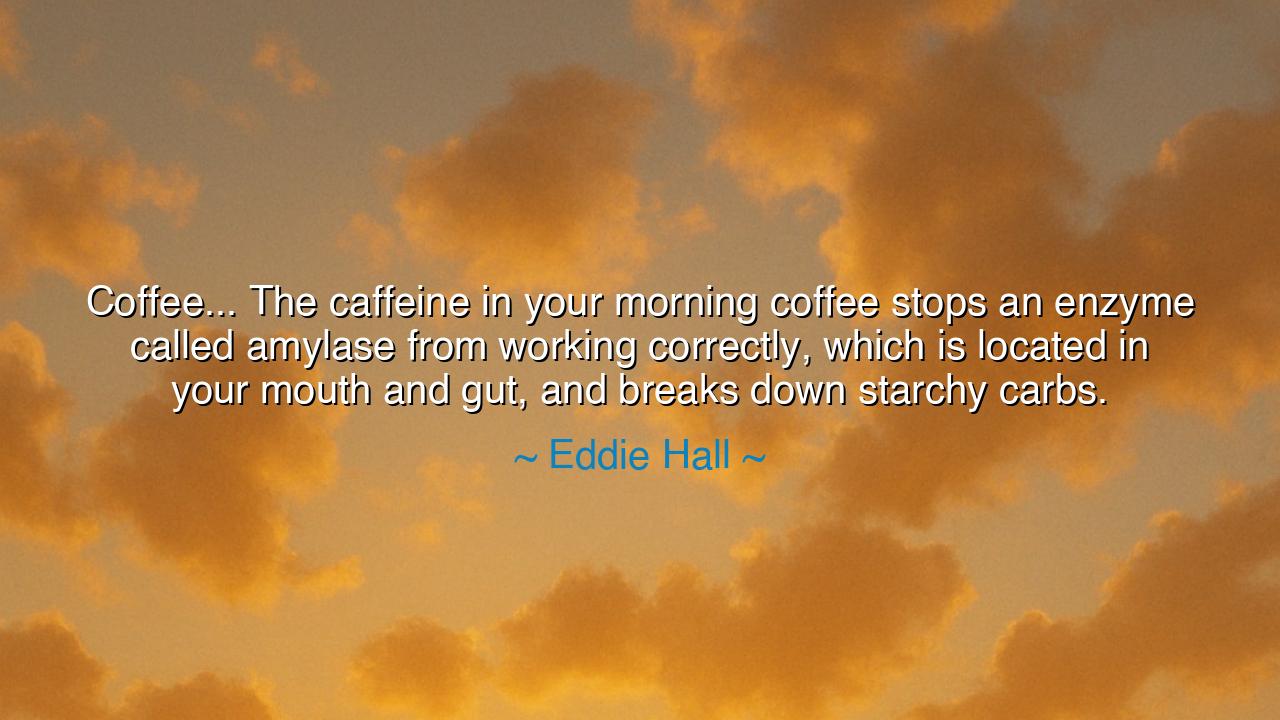
Coffee... The caffeine in your morning coffee stops an enzyme
Coffee... The caffeine in your morning coffee stops an enzyme called amylase from working correctly, which is located in your mouth and gut, and breaks down starchy carbs.






The words of Eddie Hall, “Coffee… The caffeine in your morning coffee stops an enzyme called amylase from working correctly, which is located in your mouth and gut, and breaks down starchy carbs,” resound not only as a lesson in physiology, but as a deeper reflection on the hidden costs of what we consume. They are the words of a man who knows the body, who has pushed it to its limits as a strongman, and who has studied how even the smallest choices shape strength and health. In his statement lies the recognition that even a simple cup of coffee—beloved across the world—has unseen effects, altering the very processes of digestion and energy.
The origin of these words lies in Hall’s own discipline as an athlete. To lift unimaginable weights, to push the body to its utmost, requires not only training of muscle, but mastery of diet, sleep, and ritual. His study of amylase, the enzyme that begins the digestion of starch, reveals the seriousness with which he regarded even the smallest detail. For to him, food was not mere pleasure—it was fuel, and its handling within the body determined victory or defeat. Coffee, then, was not just a drink, but a force that changed how the body turned food into strength.
History has always taught us to be mindful of what we consume. In the writings of Hippocrates, the father of medicine, food was declared to be both medicine and poison, depending on how it was used. The ancients believed that every herb, every drink, every morsel shaped the balance of humors in the body. Just as Hall speaks of coffee disrupting the harmony of digestion, so too did the physicians of old warn of excess, teaching that power lies not in indulgence but in wise restraint.
Consider also the story of Milo of Croton, the ancient wrestler who trained by carrying a calf daily until it grew into a bull. His strength was not built on raw effort alone, but also on the care of his diet. Had he ignored what he ate and drank, his training would have faltered. Likewise, Hall’s meditation on coffee is a modern echo of this eternal truth: the body is a temple, and what enters it shapes its power. Even small things, like the blocking of an enzyme, can shift the tides of strength and endurance.
The lesson is not to demonize coffee, nor to reject the comforts of life, but to cultivate awareness. What you consume carries unseen effects, shaping the hidden processes of your body and spirit. To live without awareness is to live blindly; but to study, to observe, to understand, is to live in mastery. Hall’s words invite us to consider not just the taste of coffee on the tongue, but the work it halts in the gut, and the long echoes that choice leaves upon the day.
Practically, this means approaching food and drink with respect and intention. Enjoy your coffee, if you choose, but do so knowing its effects. Balance it with nourishment that strengthens, with habits that restore. Learn not only what delights you in the moment, but what sustains you in the long journey. Like the athlete, you must treat your body as both tool and temple, not feeding it carelessly, but with discipline and wisdom.
So, beloved listener, take Eddie Hall’s words as a reminder: even the smallest act—a sip, a bite, a habit repeated daily—has power over your strength, your clarity, your life. Do not drift through your days unaware, but awaken to the hidden forces shaping you. For the path to greatness, whether of strength, mind, or spirit, is not built on great deeds alone, but on the countless small choices that align the body with its highest purpose. And in this, even coffee becomes not just a drink, but a teacher.






AAdministratorAdministrator
Welcome, honored guests. Please leave a comment, we will respond soon